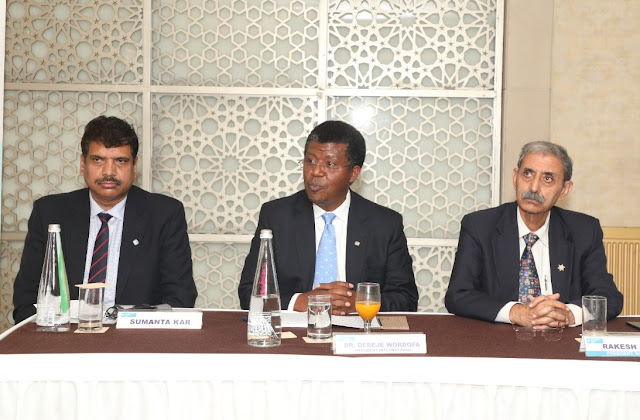Don’t lose focus on 200 million children in distress worldwide: Dr. Dereje Wordofa, President, SOS Children's Villages International
by Priya J
- Dr. Dereje Wordofa, the fourth president in the 70-plus year history of SOS Children’s Villages, is currently on a visit to India
- Securing long-term, wholesome care and development for children without parental care is vital so that they can realize their full potential and serve as Ambassadors of Change
Bangalore, December 1, 2021: Dr. Dereje Wordofa, President of SOS Children’s Villages International, has said there are 200 million children in distress across the world, including children without parental care. While SOS Children’s Villages of India has reached out to over a million children through its advocacy, family strengthening and family-like care programmes, that is clearly not enough. “We all need to deepen and strengthen existing partnerships with governments, institutions and partners, as well as forge new partnerships to make a difference in the lives of millions of more children worldwide, including in India,” he said.
Dr. Dereje Wordofa is currently on a visit to India. Hailing from Ethiopia, he is the fourth president in the 70-plus-year history of SOS Children’s Villages. Prior to joining SOS, Dr. Wordofa’s career took him on a journey from being a programme officer in the field to a diplomatic role as the United Nation’s Assistant Secretary General of the UN Population Fund.
Throwing light on the plight of children in distress, Dr. Dereje Wordofa said: “About 153 million children worldwide are orphans and 160 million are child labourers. Nearly half of all deaths in children under the age of 5 can be attributed to undernutrition, resulting in the unnecessary loss of about 3 million young lives a year. These are not mere figures; these are lives which constitute the future of nations and the world. There is an urgent need for intervention, not only by the governments but by each one of us collectively. While there is an ongoing effort from individuals, organizations, agencies and governments to take care of these children, much more needs to be achieved, and that too at a sustained yet accelerated pace.”
The pandemic posed serious challenges for communities and vulnerable children worldwide. SOS Children’s Villages supported them with dry ration and hygiene kits, awareness on COVID-19 prevention protocols and vaccination, digital learning to avoid disruption of education and securing long-term and sustainable livelihoods and capacity building. Mental health has been another concern, especially with lives being disrupted and children experiencing the impact even more strongly. Counselling, creative indoor activities, and active support helped meet this challenge to a large extent.
Dr. Dereje Wordofa said: “Securing long-term, wholesome care and development for children without parental care is vital so that they can realize their full potential and serve as Ambassadors of Change. Education, health, nutrition and safety are serious priorities. Besides, child abandonment is a pressing challenge. There is an urgent need to prevent this by empowering communities and caregivers through skilling and education, preventing disruption of education and securing health and nutrition. Accelerating behavioral changes for the greater good are also paramount. Social change in areas of gender discrimination, girl child education, curtailing child marriage and such are vital for a better tomorrow.”
SOS Children’s Villages strives to provide children without parental care, or at the risk of losing it, a value chain of quality care services that goes beyond childcare alone, ensuring comprehensive child development. In India, its customized care interventions include Family Like Care, Family Strengthening, Kinship Care, Short Stay Homes, Foster Care, Education & Youth Skilling, Emergency Childcare and Special Needs Childcare. These are aimed at transforming lives and developing children into self-reliant and contributing members of society. The institution also empowers vulnerable families in communities to become financially independent, thereby enabling them to create safe and nurturing spaces for children under their care.
SOS Children’s Villages also increases employability of youth and helps unlock the inherent potential of young adults so as to secure to them long-term, productive and sustainable livelihoods. This is done through education, skilling, mentoring and soft skills and life skills enhancement.
The journey of SOS Children’s Villages in India began in 1964. Today, the institution is present in 32 States and Union Territories of the country, serving more than 30,000 children each year. “This just goes to establish our strong bond with India. However, there is so much more that needs to be done, for which we are actively welcoming partnerships and collaboration at various levels, as we understand the need for a collective effort,” added Dr. Wordofa.
About SOS Children’s Villages of India: Established in 1964, SOS Children’s Villages of India provides children without parental care or at the risk of losing it, a value chain of quality care services that goes beyond childcare alone, ensuring comprehensive child development. Our customized care interventions such as: Family Like Care, Family Strengthening, Kinship Care, Short Stay Homes, Foster Care, Youth Skilling, Emergency Childcare and Special Needs Childcare are aimed at transforming lives and enabling children under care into self-reliant and contributing members of society. The organization empowers vulnerable families in communities to become financially independent, thereby enabling them to create safe and nurturing spaces for children under their care. Today, over 6,500 children live in more than 440 family homes, inside 32 SOS Children’s Villages of India, in 22 States/UTs, from Srinagar to Kochi, and Bhuj to Shillong. They are lovingly cared for and nurtured by over 600 SOS Mothers and Aunts. As India’s largest self-implementing childcare NGO, SOS Children’s Villages India directly touches the lives of around 30,000 children every year.
For more information, please visit: https://www.soschildrensvillages.in



Comments
Post a Comment